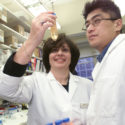It’s been a busy winter for UT researchers, particularly in the field of cancer research. Last week a team announced some important findings about prescreening and prevention for low-income women, and this week they’ve basically figured out how to starve cancer. “A research team led by scientists at The University of Texas Austin has engineered an enzyme that safely treats prostate and breast cancer in animals and also lengthens the lifespan of models that develop chronic lymphocytic leukemia,” according to a UT press release.
The study was published in a paper in the Nov 21, 2016 issue of Nature Medicine, which includes details about the new treatment and the results from preclinical trials.
From the press release:
Many cancers depend on the non-essential amino acid cysteine to grow, survive, and even resist many chemotherapeutics. George Georgiou, a professor of molecular biosciences and chemical engineering, and Everett Stone, a research assistant professor in molecular biosciences, led a team that was able to capitalize upon these observations by engineering a human enzyme to systemically degrade cysteine. The UT research team showed that injection of their cysteine-degrading enzyme into animals leads to the elimination of cysteine in blood and thus deprives the tumor cells of what they need to grow.
“With this treatment approach, cancers build up toxic molecules of their own making because we took away their ability to make an antioxidant that is really important to them—but not necessarily important to a normal cell,” Stone said. “A very important component of our result is that there are no apparent side effects.”
The results of the preclinical trials showed that using the engineered enzyme to selectively eliminate cysteine had no adverse effects on healthy cells yet effectively impacted a variety of cancer types, inhibiting their growth and survival.
Learn more about this groundbreaking study in the UT News Room.
Featured photo from Wikimedia, Creative Commons licensed








